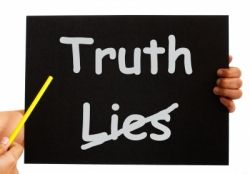How to tell if someone's lying

Become a human lie detector
Everyone lies. That's a fact. Some people only tell white lies. Some tell whoppers. Some lie very rarely. While some lie all the time. The point is, everyone lies and if you watch close enough, you can tell if someone's lying.
Everyone has a tell. When a person lies, they unconsciously do something that gives them away. It could be a facial expression. It could be the pitch of their voice. They might talk different or say a specific phrase. Or maybe their body language changes. Once you figure out what someone's tell is, you'll know every time they lie.
Photo Credit: Stuart Miles
Types Of Lies
- A white lie: A small lie, usually not meant to hurt anyone
- Total fabrication: When you completely make something up.
- Lying by omission: When you don't tell the whole truth. When you tell a true story but you leave something out.
- Accidental lie: When someone says something they think is true, but it's not.
- Exaggeration: When you tell a basic truth but then add lies to make it sound better.
How about you?
Do you lie?
Watch Their Eyes
Eyes make great lie detectors. How a person looks at you, how fast they blink, and what their eyes look like can all tell you if they're probably lying. Three things you need to watch for are staring, pupil dilation and blink rate.
A lot of people think that if someone looks you in the eye, they must be telling the truth. But in fact, the opposite may be true. When someone lies, they might feel like you'd believe them if they make eye contact. So they'll force themselves to stare into your eyes, sometimes for an uncomfortable amount of time. And while they're making all this eye contact, they'll usually freeze their upper body. One way to tell is to think back through your whole conversation. Did they keep eye contact the whole time? Then they're either telling the truth or the whole conversation was a lie. Was there one specific time they looked into your eyes? Whatever was being said during that eye contact was probably a lie. Did they completely avoid looking into your eyes? This could be a sign of embarrassment about lying.
Another thing to look at is their pupils. Pupils dilate when someone is trying to concentrate. So pupil dilation can be a sign that they're trying to keep their story straight. Try asking for details and see if their pupils dilate.
Watch how fast they blink. Another thing that happens when a person tries to concentrate is that their blink rate will slow down. They'll blink slower while they're telling a lie and then after they're done, they'll blink super fast.
Not everyone believes this, but I figured I'd add it anyways. The left hemisphere of your brain deals with logical, factual thinking, while the right hemisphere deals with creative thinking. So some believe you can tell whether a person is lying by the direction they're looking. If you ask a question and they shift their eyes to their left (your right), it usually means they're recalling a memory. If they look to their right (your left), it means they're making something up.
Listen To How They Talk and What They Say
Everyone has their own normal speech patterns. They talk a certain way. They use certain words. When a person lies, these speech patterns change.
Listen to the words they're saying. Liars don't like using contractions. Instead of saying "I won't..." they say "I will not...". Listen for phrases that avoid specific truth like "To the best of my knowledge".
Listen to the sound of their voice. When telling a lie, a persons voice will often take on a higher pitch. Sometimes it's barely noticeable but it's there.
Watch for delays. If a person has to tell a lie on the spot, if they haven't had time to prepare, they'll procrastinate in an effort to delay the conversation while their mind races to come up with a story. Signs of procrastination are stuttering, rambling and repeating what you say. Another sign of delay is if they focus on just the details in order to not talk about the main lie.
Listen to their speech rate. Everyone has their own rate at which they talk. Some talk slow, some fast and some right in between. But when telling a lie, that speech rate could change. Some people will talk faster in an effort to spit the lie out. Some talk slower. My first husband always speaks a fraction slower when he lies. That makes it nice for me because I can tell when he's lying, even when we're talking on the telephone.
Listen To Their Story
When someone prepares a lie, they come up with all sorts of details to make their story sound more believable. The problem with that is most people don't remember little details in their daily life unless they have a specific reason to. Another sign of a lie is if they remember those details without thinking about them. A liar will answer questions quicker than someone who's telling the truth because a liar is prepared for your questions, while a truth teller has to take time to remember. Of course, this is only true if the liar has had time to prepare. An on-the-spot lie will take more time (see previous paragraph about delaying conversation).
However, if someone's prepared a lie, you can still trip them up by asking them to tell their story backwards. Because they've only rehearsed it from beginning to end, they'll trip up on the details when asked to tell it from end to beginning.
Watch Their Body Language
A persons body language can tell you just about anything because unless they make a conscious effort to control their movements, their body will tell the truth. Watch their hands, their shoulders, their head movements, their feet and how they hold their body.
When a person doesn't have confidence in what they're saying, they'll raise one shoulder slightly. This doesn't necessarily mean they're lying. It just means they don't fully believe what they're saying. So if you ask someone a question and while they're answering, you notice their shoulder twitch or raise slightly, they're probably telling a half-truth.
Watch their head movements. Looking at the floor to avoid eye contact is a sign that they don't want you to see them lying. Also look for contradicting actions like a person saying no but shaking their head yes. On a positive note, this means that the liar is struggling with their lie, that they don't really want to lie.
When a person lies, they might be extra conscious of their body language. So they might go a little too far to control their movements, resulting in them freezing their upper body.
What are their feet doing? Are they pointed towards the door? That could be an unconscious effort to have an escape route. Are they fidgety? A nervous liar will sometimes relieve their nervousness by shuffling their feet around.
How about their hands? When telling a lie, a lot of people have an unconscious urge to touch their face, neck or hair.
Learn About Body Language
Body Language 101CHECK PRICE
Book of Body LanguageCHECK PRICE
Body LanguageCHECK PRICE
Fake Smiles
If you want to put someone at ease, you offer them a smile. If you want someone to believe your story, you offer them a smile. The difference is that one of these smiles is fake. A real genuine smile will create wrinkles in the corner of your eyes, while a fake smile will only show on your mouth.
Defensive and Deflective Speech
In an effort to stop the conversation from even starting, a liar will attempt to deflect questions. They do this by avoiding giving a direct answer. One way is to answer a question with a question. For instance: "Did you steal $40 from me" is answered with "Why would I steal money from you?". Another way is to give an indirect answer. For instance: "Did you steal $40 from me?" is answered with "I have my own money".
If a liar thinks you might not believe them, they'll become defensive. That's when they start to act irrationally.
They'll answer questions they haven't been asked in an effort to bolster the lie.
They'll give you reasons why they can't be lying.
Sometimes they'll ask "Why would I lie about this?". And if they're really feeling pressure, they'll try to turn the tables by asking why you don't trust them or what they've done to lose your trust.
They'll point the finger at someone else, anyone else.
If after all this, they still don't feel like you believe them, a liar will sometimes declare the conversation over and refuse to talk about it anymore.
Micro-Expressions
We all have facial expressions that we can control with little effort. But micro-expressions are harder to control because they're so fleeting and for the most part, involuntary.
When you see someone you hate, your face will show that hate, even if it's for only a fraction of a second. The same thing happens when you try to pretend bad food tastes good. At the first taste, your face will automatically scrunch up for a second before you force a fake smile and say how good it tastes.
A person who's lying will often portray fear on his face. You just need to be paying enough attention to see it. The micro-expressions commonly seen when someone is in fear are slightly pursing the lips or stretching them horizontally, raised eyebrows, and swallowing. Micro-expressions can be difficult to read and even if you see them, it doesn't mean the person is guilty. It just means there's a higher probability of guilt.
Learn About Micro Expressions
Emotions RevealedCHECK PRICE
Unmasking the FaceCHECK PRICE
Decoding MicroexpressionsCHECK PRICE
Video on How To Spot A Liar
Reasons Why People Lie
How To Get At The Truth
There are certain things you can do to trip up a liar and get at the truth. Logic, staying level-headed, and being alert to their words and actions are the best defense against any liar.
- Be specific and ask specific questions. Asking a vague question will only get you a vague answer.
- Don't make accusations. That only encourages them to lie. Instead, try to make the person comfortable. Try to get their guard down. In some instances, you can ask about it in a joking manner. For instance, "If I walk into your room, am I going to be able to see the floor?" encourages your child to tell the truth rather than asking outright if they cleaned their room. Another way is to appear to be distracted while asking them about it in a non-threatening way. This makes it seem like normal conversation.
- Ask them some easy questions that you know they will tell you the truth and then ask some questions that you know they will lie about. Try to spot any differences in their behavior and speech patterns.
- Lie to them. Make them think you already know the truth. Or make them think whatever they're lying about doesn't matter. This may trick them into telling the truth.
- Offer no consequences. I always save this for last. If nothing else works and all you really care about is getting to the truth, then tell the person there won't be any consequences. But remember, if it works and they tell you the truth, you HAVE to stick to your word! It's the only chance you have of getting the truth next time.
Establishing A Baseline
Before using any of the tips in this article, you must first establish a baseline behavior. You do this by studying their behavior before you speak to them and by asking neutral questions to gauge the reactions. This will allow you to see any changes in their behavior. Skipping this step can lead to false accusations. Take me for instance. I'm always swinging my feet everywhere. I have trouble making eye contact. I rarely use contractions when I speak. And when stressed or nervous, I get easily confused. Someone that didn't know me might think any of these behaviors was my tell. They'd be wrong. My tell is that I get overly conscious of my movements, so I stop moving completely. (But don't tell anyone that)
Also, there are a few instances where you won't be able to tell if someone is lying. If they think they're telling the truth, they won't show any signs of lying. If a person is a Sociopath, they probably won't show any signs of lying because they're master manipulators. And if a person is a compulsive liar, you may not be able to tell because lying comes as second nature to them.
Learn More About Spotting Lies
Spy the LieCHECK PRICE
Spot Lies Like the FBICHECK PRICE
LiespottingCHECK PRICE
Photos and text; © 2012-2013 Catherine Taylor. All Rights Reserved*
Reproduction in whole or in part without permission is prohibited.







